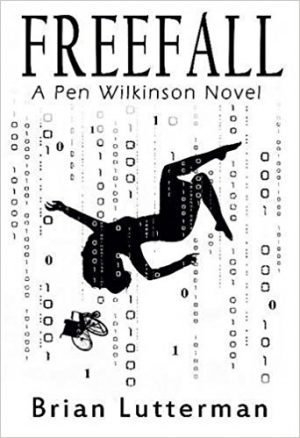 Written by Brian Lutterman — Pen Wilkinson has appeared in two previous books in this contemporary amateur sleuth series, and author Brian Lutterman gets points for creating a protagonist who uses a wheelchair. Pen works in the US Attorney’s office in Los Angeles, so does have solid contacts in law enforcement and strings she can pull when she needs investigatory assistance, but everyday issues are a challenge. Lutterman acknowledges the practical aspects of her disability – say, when she can’t reach a pair of scissors on the kitchen counter or has to disassemble her wheelchair to fit it into a rental car – as well as its impact on her relationships with other people.
Written by Brian Lutterman — Pen Wilkinson has appeared in two previous books in this contemporary amateur sleuth series, and author Brian Lutterman gets points for creating a protagonist who uses a wheelchair. Pen works in the US Attorney’s office in Los Angeles, so does have solid contacts in law enforcement and strings she can pull when she needs investigatory assistance, but everyday issues are a challenge. Lutterman acknowledges the practical aspects of her disability – say, when she can’t reach a pair of scissors on the kitchen counter or has to disassemble her wheelchair to fit it into a rental car – as well as its impact on her relationships with other people.
Pen lost her mobility as an adult, the result of a car accident, so is acutely aware of how people treat her differently than before – their slight hesitation before shaking hands, their awkwardness when they need to help her, their treating her almost as if she had a contagious condition. Fine, empathetic work. Pen is a get-on-with-it kind of gal and, at least in this novel, has come to terms with her situation and is clever with work-arounds.
Pen was driving when the accident occurred, and her sister’s young daughter was killed. It’s a tragedy Pen will never fully recover from. Although she was not held responsible for the accident, she still blames herself. And so, apparently, does the girl’s mother, Pen’s older sister Marsha. The rupture between them has brought to the surface Marsha’s longstanding resentment of Pen, and guilt over her resentment has led to hostility. But now Marsha needs Pen.
Marsha is a labour and delivery nurse, living in Tampa. About a year before the book begins, Marsha’s son Kenny, a computer prodigy, left Marsha’s home to live with his father and stepmother. He then convinced them to move to Minneapolis. Why people would leave sunny Florida for the notorious icy winters of Minnesota, Marsha can’t understand and no one has adequately explained. That’s mildly unsettling, though what has her worried at the book’s outset is that Kenny has gone missing.
Pen agrees to look into the situation for her. Doing so means managing a difficult law case long-distance, which her boss resents mightily, and enduring the well-meaning concern of her boyfriend James, worried that she keeps entangling herself in risky situations.
The police seem not worried about Kenny’s disappearance, nor is his father terribly concerned. It appears Kenny was doing some programming, which she quickly diagnoses as hacking, for a mysterious person called Z. Z is well known to some of Pen’s old friends in the banking industry and to law enforcement and best known for a string of ransomware exploits, but has been strangely quiet for a year or so. The book takes advantage of the growing appreciation of the vulnerability of systems and institutions to cybercrime, such as described in Chris Brookmyre’s new book Want You Gone, and financial institutions in particular.
This is a multiple point-of-view novel, and you know Z is planning something big. Since Pen’s Minneapolis banker friends have told her about a looming proxy fight for control of a major bank, that seems a juicy target. It seems the cyber disaster being planned could lead to economic chaos. The risks to Kenny are coming from at least two directions, since Z believes Kenny is expendable and another of his hacker friends back in Tampa is murdered by a highly trained team of mercenaries.
Given the settings he’s chosen – Minnesota and Tampa – Lutterman has considerable opportunity for exploring how such vastly different urban cultures shape people and events, but there’s a feeling this story could have played out just about anywhere, just by renaming the streets and highways the characters drive on.
The novel has a complex plot peopled by members of the Russian mafia, mercenaries, hackers, banking insiders, the FBI and local law enforcement, plus Kenny’s friends and family. Many of them are not behaving as Pen would expect them to. Yet she repeatedly arrives at conclusions without much indication of how she reached them.
If you like cybercrime plots and don’t think too hard about it, Lutterman’s fast-paced story will carry you forward. However, Freefall would greatly benefit from more realistic dialog and less backstory about the mercenaries. The real heart of the book is Pen, Lutterman’s captivating protagonist, dealing with her significant challenges and urgent desire to reconnect her family.
Freefall is out now in the UK and comes out 10 May in the UK. For another disabled detective try Jeffery Deaver’s Lincoln Rhyme series.
Conquill Press
Print/Kindle
£12.80
CFL Rating: 3 Stars










